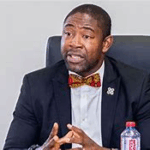
Former Minister of Health Dr Bernard Okoe Boye has justified the New Patriotic Party (NPP) youth wing’s protest taking place in Accra today, Tuesday, September 23, arguing that the most fundamental feature of Ghana’s democracy, freedom of speech, is under serious threat.
Speaking to JoyNews at the protest grounds, Dr Okoe Boye said, “We are here because the most fundamental feature of a democracy is being attacked and it’s being threatened. And that fundamental feature is the freedom of speech,” he stated.
The former minister stressed that democracy thrives on tolerance of divergent views, even when expressed crudely.
“By virtue of my level of education, training, and personal values, there is a way I will put a point across which might look to you very proper. But you have others who also want to make a point but might not have the training and intellect to do so. They will speak in a blunt manner, sometimes in an insulting manner, but the beauty of democracy is that all such people are tolerated in society.”
He cautioned against arresting people for their opinions, insisting it sets a dangerous precedent.
“Immediately somebody can be arrested and handcuffed for talking in a way that in another person’s judgment is not proper; it means all of us are in danger. You might think you are speaking well today, but the one in power tomorrow will say that your speech is not proper and that is a threat.”
Dr Okoe Boye added that silencing citizens through fear of arrest could kill Ghana’s dynamism and innovation.
“All democracies or societies that were successful in the past, what made them lose their success was the culture of silence. Because people are being arrested for what they post on TikTok, or how they speak, it will get to a time before someone will talk; the person will think twice… and when people stop speaking, the society is no more dynamic and we will lose our innovativeness and drive.”
He explained that the protest had two key aims: to defend free speech and to push back against what he described as unprofessional conduct by the police.
“We are here for two reasons: to make sure that freedom of speech is protected, and secondly, to protest against the behaviour of institutions like the police, who are expected to be professional and neutral.”
Citing examples, Dr Okoe Boye accused the police of selective justice.
“Why would you say that Chairman Azorka of the NDC has been arrested and given bail when there is no picture of his interaction in his arrest, but when you get Abronye DC, you put him in handcuffs, take a picture, and it goes viral on NDC platforms? Why do you go to Sir Obama, an NPP activist, at 4 a.m., break through his door, and enter his room—not that he has touched or harmed anybody—but because he posted a picture on Facebook? I mean, these are dangerous precedents.”
He concluded by challenging the record of President John Dramani Mahama, suggesting that despite his calm appearance, his administration is presiding over worrying democratic reversals.
“Let’s all be honest. If anybody told you that NDC under President JDM will do this, would you believe it? Look at the nature of President John Mahama on the outside—very calm, very tolerant—yet under him, look at what is happening.”
Background
The protest was largely triggered by the arrest of Kwame Baffoe, widely known as Abronye DC, who serves as the NPP’s Bono Regional Chairman. He was detained on September 8 and charged with offensive conduct likely to cause a breach of the peace, as well as publishing false news.
Beyond Abronye’s case, the demonstration also reflects mounting frustrations over what the party describes as intimidation and harassment of its members.
These include incidents involving high-profile figures such as Chairman Wontumi (Bernard Antwi-Boasiako) and a number of social media activists sympathetic to the NPP.
Protesters are demanding an end to what they view as politically motivated arrests and remands that disproportionately affect opposition members.